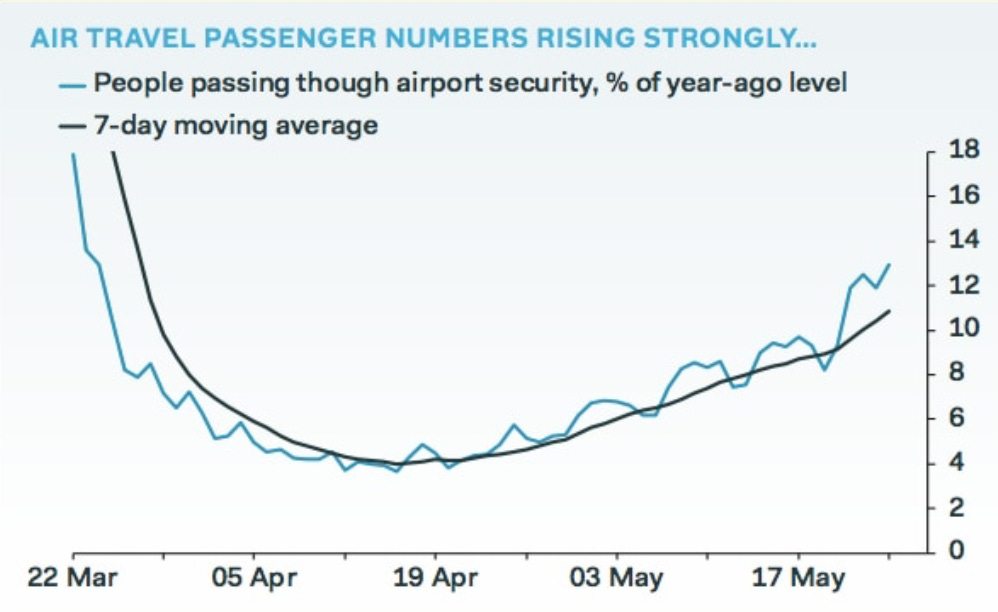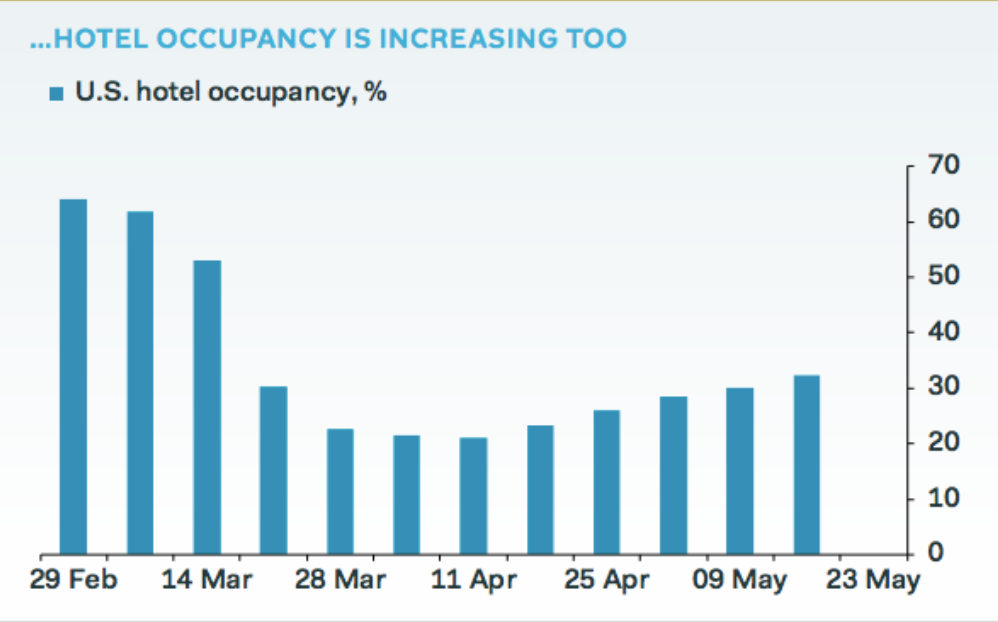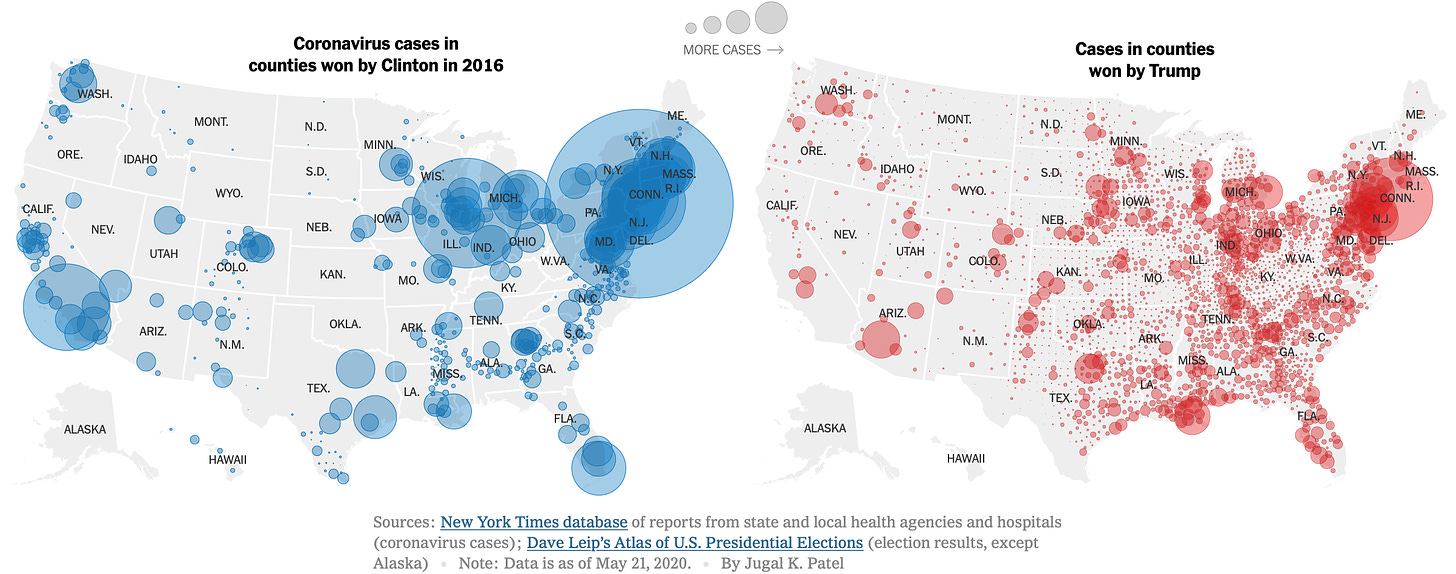Founding Member Rate: Like the newsletter? During this trial period, you 50% off the regular cost. Continued thanks to everyone who already has done so!
The World
The economy is tiptoeing back to life. The tentative thaw is showing up in measures of economic activity — from restaurant reservations to airline ticket purchases — that have been throttled. U.S. consumer confidence is edging up in May, and new home sales unexpectedly rose in April. Of course, the upticks offer little clarity about the speed, scale and durability of a recovery. (Finance 202, Reuters, Pantheon Macroeconomics)


As the meat industry tries to get back to normal, workers are still getting sick — with warnings that grocery stores’ meat supplies could shrink 35 percent, prices could spike 20 percent and the impact could become even “more acute later this year.” Meanwhile, the Agriculture and Justice Departments are investigating whether the meatpacking industry is fixing or manipulating prices. (Washington Post, Politico)
Democrats are far more likely to live in counties where the virus has ravaged the community, while Republicans are more likely to live in counties that have been relatively unscathed, though they are paying an economic price. Counties won by President Trump in 2016 have reported just 27 percent of the virus infections and 21 percent of the deaths — even though 45 percent of Americans live in these communities. (New York Times)

Hong Kong is in shock as China goes for the “nuclear option’ — a willingness to alter the onetime British colony’s special status as a self-governing city. The Chinese foreign ministry said democracy protests are fanned by “terrorists” who pose an imminent threat to national security. (Wall Street Journal, The Times)
China-India tensions mount as troop stand-offs along a disputed border cause speculation to swirl. (South China Morning Post)
Hungary aims to lift a state of emergency on June 20, as the government prepared a bill ending the power to rule by decree which drew international condemnation. (Reuters)
France and Germany lined up bailouts worth €14bn to take equity stakes in big industrial companies. Germany is set to take a 20% stake in Lufthansa. Britain drew up a similar plan to prop up strategic firms. (The Telegraph)
Savings rates are surging across Europe, fueling fears that consumers will not come to the rescue of the continent’s shrinking economy. (Financial Times)
Economy
Interest rates sit at their lowest level on record, but mortgage availability has tightened sharply. Meanwhile, U.S. home-price growth accelerated in March, as the Case-Shiller index rose 4.4% on an annual basis, the highest rate since December 2018. (Wall Street Journal, Wall Street Journal)
Global trade flows tumbled in the first quarter, a preview of what could be the largest contraction in international commerce in decades. The steep drop shows the pitfalls of cross-border supply chains as multinationals strain to bridge new gaps in production. (Wall Street Journal)
As tensions with US boil, China hints at a weaker yuan. Beijing's central bank set the reference rate against dollar at its lowest level since 2008. (Nikkei Asian Review)
Rich countries are set to take on at least $17 trillion of extra public debt as they battle the economic consequences of the pandemic. (Financial Times)
Technology
After 9 years, astronaut launches return to U.S. tomorrow with SpaceX. If successful, it could open a new era for the industry. Here’s how to watch it. (Atlas Obscura, MIT Technology Review, Wired)
Mark Zuckerberg faces a rebellion by investors over his dual role as Facebook’s chairman and chief executive. A majority of its independent shareholders are expected to call for an independent chairman at Wednesday’s annual meeting. (The Times)
Amazon is looking to invest in localized podcast content, like news and sports, as the company plans to buy more TV rights and have adjacent audio content. Amazon sees a strategic advantage in podcasts by leveraging Alexa voice tech to help users discover personalized content. (Axios)
With concerts and music festivals cancelled, artists are flocking to virtual gaming platforms like Minecraft and Fortnite to give fans the next best thing to a live music experience. (Axios)
The U.S. signals a broader crackdown on the Chinese communications sector. Meanwhile, UK Ministers suspect it will be impossible to remove Huawei technology from Britain’s telecoms networks by 2023 despite mounting fears about security risks. (Politico, The Times)
Smart Links
The tumultuous history of the U.S. Postal Service. (National Geographic)
What happens to coronavirus on an airplane. (Wall Street Journal)
How a grad student solved the epic Conway Knot Problem — in a week. (Quanta)
Hong Kong shows the future of eating out. (The Atlantic)
The future of supply chains. (Euromoney)
Momentum builds for sports reopening. (Wall Street Journal)
Good News
Hearing that medical workers were sleeping in campers, this group gives them free temporary condos. (Washington Post)
Technical Sergeant Jason Covey played "Taps" standing alone in the Culpeper National Cemetery for Memorial Day. (WFLA)


Did you like the newsletter? Why not subscribe now?


